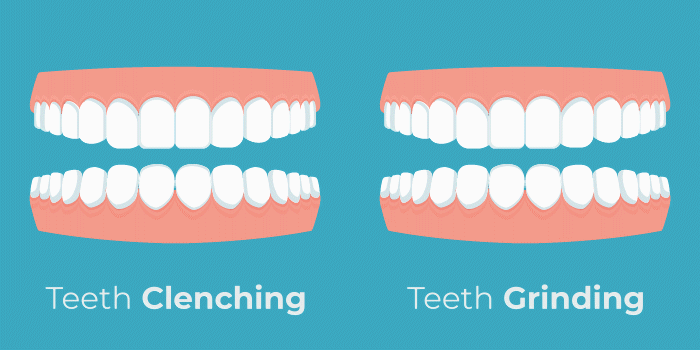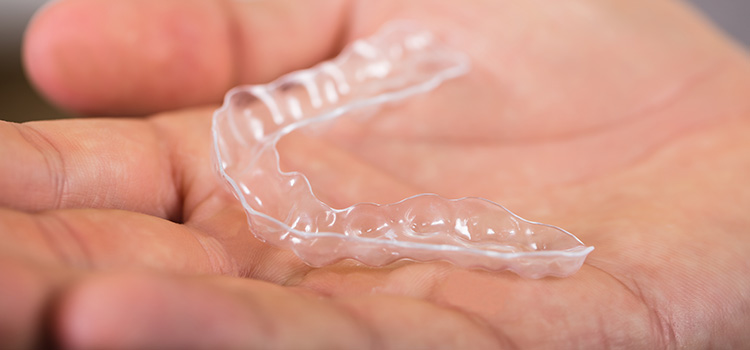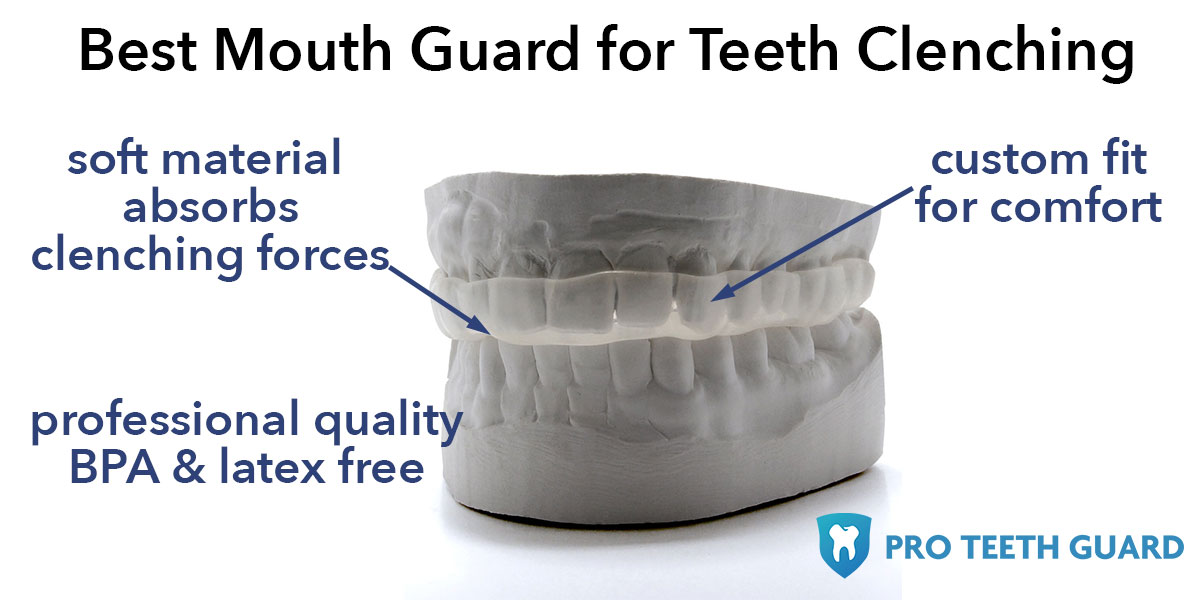A mouth guard for clenching teeth helps to protect your teeth and jaw. Habitual teeth grinding and teeth clenching (also known as bruxism) can be very damaging to overall oral health, causing a host of issues such as cracked or chipped teeth, headaches, jaw pain, and TMJ disorders. A mouth guard, also called a night guard or dental guard, is a simple and effective way to protect your teeth if you suffer from bruxism. A dental mouth guard for grinding teeth offers a protective barrier and helps minimize bruxism damage.
In this article, we discuss the difference between teeth grinding and teeth clenching (the two ways people exhibit bruxism), who needs a night guard, and the best night guard for teeth clenching and grinding teeth. We also present some ways to stop clenching and grinding.

Bruxism: Teeth Clenching and Grinding Teeth
If you experience bruxism, chances are you have been told by your dentist that you need a night guard. Teeth grinding and teeth clenching are two different ways in which bruxism manifests. Since the complications are different, a mouth guard for grinding teeth also differs from a mouth guard for clenching teeth. While grinding and clenching are usually lumped together, they are actually two different behaviors, and some bruxers only suffer from one or the other. In some cases; however, bruxers both grind and clench. Nevertheless, it is helpful to understand the difference between the two behaviors in order to assess treatment options.
Teeth Clenching
The American Academy of Oral Medicine states, “Clenching is simply holding the teeth together and tightening the jaw muscles. Clenching generally results in less obvious wear to the teeth but can still result in substantial muscular soreness, pain, and damage to the jaw joint”. This behavior exerts a large force between the upper and lower teeth, and strains the jaw muscles. This excessive pressure can:
- Cause headaches and earaches
- Cause soreness of the jaw and cracked teeth
- Lead to temporomandibular joint problems (commonly known as TMJ disorders.)
Teeth Grinding
Teeth grinding is slightly different from teeth clenching; It is essentially the forceful rubbing together of the upper and lower teeth repeatedly. In an interview, Dr. David Okano explained the main difference between clenching and grinding: “Grinding would be that you'd probably be moving your teeth back and forth, front and center and the net effects are it wears down the surfaces of your teeth and could also lead to future problems with tooth fractures or even bone loss around the roots of your teeth”. If repeated overtime, this action can:
- Flatten out the natural grooves of the teeth
- Weaken the teeth as a whole
- Potentially even causes tooth loss.
- Like teeth clenching, teeth grinding may also cause headaches, stiffness and pain in the jaw.

- Most Popular
- Hard Outside, Soft Inside
- 2MM Thick
- Moderate / Heavy

- Most Durable
- Hard Materials
- 1.5MM Thick
- Heavy / Severe

- For Day Time Use
- Thin, Barely Visible
- 1MM Thick
- Light / Moderate

- For Clenching
- Flexible & Soft
- 1.5MM Thick
- Light / Moderate
How Can a Night Guard for Teeth Clenching Help Me?
The most common and effective remedy for clenching and grinding during sleep is a custom bite guard. A mouth guard for clenching works on a fairly simple principle; it creates a barrier between your teeth that acts as a protective layer.
Teeth grinders and clenchers can benefit from wearing a mouth guard, and as such, it is one of the most common forms of treatment for bruxing and TMJ. The mouthguard works on two fronts:
- Reducing the amount of pressure that is exerted on the upper and lower jaw.
- Providing a protective barrier between the upper teeth and lower teeth, thus reducing the chance of tooth damage.
How do I know if I need a night guard?
Many people are not aware that they have bruxism because they suffer from sleep bruxism and tend to grind or clench their teeth during the night. Therefore, you might need a night guard if:
- Your dentist notices wear on teeth enamel
- A partner observes the problem when you are asleep
- You tend to wake up with an inexplicable pain in your teeth, jaw, or head
Regular dental checkups will help determine if you grind your teeth because your dentist may notice damage to your teeth before you do. Additionally, it is better to identify and treat the problem early to avoid more invasive dentistry treatments.

What are the benefits of using a mouthguard?
Simply put, the mouth guard can relieve your pain. A review of bruxism, it’s etiology, and common treatments explains that wearing your mouth guard consistently can:
- Prevent tooth damage
- Reduce muscle strain, jaw pain, and headaches
- Avoid damage to the temporomandibular joints (TMJ)
- Constrain the bruxing pattern
Mouth guards should be worn long-term, or at least until you notice an improvement in the condition. Some bruxers stop using the dental appliance because the stress that triggered the grinding/clenching is no longer a factor in their lives. The logic behind using a mouth guard is simple: it’s far easier to replace a piece of plastic than your teeth.
How to Select the Right Mouth Guard for You
Once you’ve identified that you suffer from teeth grinding or clenching and have decided a mouth guard is the right course of treatment for you, you might be overwhelmed by the options available. It is important to do your research and have open communication with your dentist about your bruxism.
To select the right mouthguard:
- Find the root cause of your bruxism (e.g. stress, caffeine consumption, genetics, sleep disorders such as sleep apnea, etc.)
- Identify the symptoms of bruxism you suffer from. This will help to distinguish if you grind, clench, or both.
- Identify the severity of your symptoms. Generally, there are different mouth guards for light bruxing, moderate bruxing, and severe or heavy bruxing.
- Recognize if you suffer from sleep bruxism/ nighttime teeth grinding and clenching or awake bruxism.
Identifying these factors will help to select the appropriate dental mouth guard clenching or grinding teeth.

Best Mouth Guard for Teeth Clenching
The best mouth guard for teeth grinding or clenching is a professional quality, custom fitmouth guard. For clenching specifically, it should be a guard made from a softer, flexible material that absorbs the clenching forces of your jaw.
While the low price of over-the-counter mouth guards from the drug store may be tempting, these night guards do not provide the comfort and protection of a professional custom night guard. Often, the guards are one-size-fits-all, which results in an ill-fit for most bruxers. Some over-the-counter guards offer some customization (e.g. boil-and-bite guards allow you to put it in hot water so that it becomes somewhat moldable); but overall, they are bulky and uncomfortable. The materials of the over-the -counter guards offer limited protection and durability. Moderate to heavy bruxers can chew right through these mouthpieces.
A custom mouth guard is made specifically for you from materials that reflect your condition, which means it will fit like a glove. Furthermore, you won’t have to worry about buying a new one every few months.
What are mouthguards made of?
A mouth guard for teeth clenching is typically made from a softer, flexible rubber material. The soft material acts as a cushion and helps absorb the clenching forces.
A mouth guard for grinding teeth is usually made from either a dual laminate material (e.g. soft on the inside and hard acrylic on the outside) or entirely from a hard acrylic material. The hard surface of the acrylic material stands up to the wear of habitual tooth grinding.
Mouth guards made of both these materials will prevent tooth-to-tooth contact and minimize the damage caused by bruxism.
Other factors to consider when choosing a mouth guard
Some additional considerations when purchasing the perfect dental night guard for you:
- A comfortable fit - The comfort of your night guard is very important to a good night’s sleep. Your guard should fit snugly on your teeth, but it should not put any additional pressure on any of your teeth.
- Thickness - Mouth guards typically range in thickness from 1 mm to 3 mm thick. If a night guard is too thin for your level of bruxing, it may not last as long. Additionally, if it is too thick, it may not rest comfortably in your mouth and result in an altered bite.
- Customization - Typically, you can choose to have a custom night guard made for either your top or bottom teeth. You can also specify the material for your guard: a hard acrylic guard for heavy grinding, or a softer material for teeth clenching.
- Safe materials - Since it’s a product you’re putting into your mouth, you want to make sure the night guard is free of any chemicals or material that you are sensitive to. E.g. you may look for a BPA free mouth guard.
- Warranties - A well-made custom night guard should be made to last. You may want to look for a night guard that comes with a warranty period.
Guarantees - Finally, a mouth guard that comes with a money back satisfaction guarantee is always preferable, since it protects you in case the product doesn’t live up to your expectations.
Related Articles:
Ways to Stop Grinding or Clenching Teeth
While a mouth guard will minimize the damage due to bruxism, it usually does not stop the symptoms (e.g. grinding and clenching teeth) altogether. Below are some potential helpful suggestions for how to stop teeth grinding and clenching:
Natural remedies
Stress is generally associated with bruxism and stress reduction may be helpful in reducing bruxism. Diet is another component of your health that may be linked to bruxism symptoms. Avoiding certain foods (e.g. alcohol and caffeine) can be helpful in reducing bruxism. Some bruxers have found success by taking vitamins and minerals (specifically C, B-5, calcium, magnesium, and potassium) as well.
Medical treatment
Certain medications such as muscle relaxants and prescriptions for anxiety can potentially help manage bruxism symptoms. In some cases, studies have shown Botox injections in the jaw can reduce bruxism symptoms in people with severe cases. As with any medical procedure, you should seek advice from your doctor regarding any treatments.
If you want the quality and comfort of a custom night guard, but don’t want to pay $400 - $800 at the dentist, you can order one directly from the source: Pro Teeth Guard offers you the same high-quality professionally made custom night guard at an affordable price.

- Most Popular
- Hard Outside, Soft Inside
- 2MM Thick
- Moderate / Heavy

- Most Durable
- Hard Materials
- 1.5MM Thick
- Heavy / Severe

- For Day Time Use
- Thin, Barely Visible
- 1MM Thick
- Light / Moderate

- For Clenching
- Flexible & Soft
- 1.5MM Thick
- Light / Moderate
References:
- AAOM Web Writing Group. (2015). Tooth Clenching or Grinding. The American Academy of Oral Medicine. https://www.aaom.com/index.php%3Foption%3Dcom_content%26view%3Darticle%26id%3D129:tooth-clenching-or-grinding%26catid%3D22:patient-condition-information%26Itemid%3D120#:~:text=Grinding%20or%20bruxism%20involves%20moving,and%20tightening%20the%20jaw%20muscles.
- Murali, R. V., Rangarajan, P., & Mounissamy, A. (2015). Bruxism: Conceptual discussion and review. Journal of pharmacy & bioallied sciences, 7(Suppl 1), S265–S270. doi: 10.4103/0975-7406.155948
- U Health Web Writers. (2016). The Problem with Teeth Clenching and Grinding. University of Utah Health. https://healthcare.utah.edu/the-scope/shows.php?shows=0_xnrbtnca